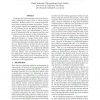Free Online Productivity Tools
i2Speak
i2Symbol
i2OCR
iTex2Img
iWeb2Print
iWeb2Shot
i2Type
iPdf2Split
iPdf2Merge
i2Bopomofo
i2Arabic
i2Style
i2Image
i2PDF
iLatex2Rtf
Sci2ools
122
click to vote
USENIX
2008
2008
Evaluating Distributed Systems: Does Background Traffic Matter?
Evaluating novel networked protocols and services requires subjecting the target system to realistic Internet conditions. However, there is no common understanding of what is required to capture such realism. Conventional wisdom suggests that competing background traffic will influence service and protocol behavior. Once again however, there is no understanding of what aspects of background traffic are important and the extent to which services are sensitive to these characteristics. Earlier work shows that Internet traffic demonstrates significant burstiness at a range of time scales. Unfortunately, existing systems evaluations either do not consider background traffic or employ simple synthetic models, e.g., based on Poisson arrivals, that do not capture these burstiness properties. In this paper, we show that realistic background traffic, has qualitatively different impact on application and protocol behavior than simple traffic models. One conclusion from our work is that applicat...
Background Traffic | Operating System | Protocol Behavior | Realistic Background Traffic | USENIX 2008 |
Related Content
| Added | 02 Oct 2010 |
| Updated | 02 Oct 2010 |
| Type | Conference |
| Year | 2008 |
| Where | USENIX |
| Authors | Kashi Venkatesh Vishwanath, Amin Vahdat |
Comments (0)

